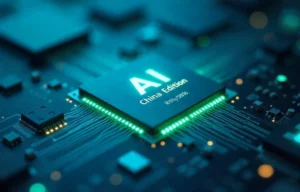

Prefer to listen instead? Here’s the podcast version of this article.
You’ve likely heard some of your more tech-oriented friends mention blockchain within the last year or two, and with good reason.
Blockchain is a distributed ledger technology that is mostly associated with cryptocurrencies like Bitcoin and Ethereum. You might think that, since you have no interest in using cryptocurrencies for your shopping life, that blockchain will never directly impact you.
Think again.
Blockchain is mostly used in conjunction with the cryptocurrency world at the moment, but the future is bright with a wealth of possibilities when it comes to this technology.
But what even is blockchain? What uses can it have outside of cryptocurrency? How will blockchain impact your life directly in the years to come?
Blockchain is what’s called a decentralized system. It records and documents transactions that individuals enter into when using digital currency. It helps to think of it as a ledger. It creates and keeps identical copies across every computer that’s connected to a network.
What makes this far reaching is that anyone can access blockchain to review information or record new data. If you’re thinking that this could pose a security risk, you’re wrong. Every block, or group of records, is protected through some of the world’s most secure cryptography. This ensures that anything that has been recorded cannot be tampered with or deleted. That’s why cryptocurrencies maintain their network without having to fall under governmental oversight.
Blockchain distributes and tracks digital information but does not allow it to be copied. The use of such a service goes beyond digital money. It has the ability to create a whole new and more secure internet.
It works in a series of steps.
But what kind of use will this technology have in our future?
Payments that cross international borders are notoriously complicated, and the services that facilitate these transfers are expensive. That’s because the act of making a transaction in two different forms of currency typically involves various banking organizations in a number of different geographic locations. The end result is a long drawn out process that can only be expedited at great cost.
How great you ask? Typical services charge a fee of 20% to speed up the transfer of funds across borders. That’s a ridiculous amount of money.
Enter blockchain.
Using this technology, we can speed the process along at a far lower price. Some have estimated that blockchain remittance costs could be as low as 2%. The transactions would also occur in real time, meaning that users would have their money instantly. No more lengthy waiting periods!
In order for this to occur though, cryptocurrencies would have to become more regulated, which is something the crypto community venomously rejects. Most experts agree though, that it’s not a matter of if the industry falls under regulations, but when.
Taking a step away from cryptocurrencies for a moment, blockchain’s unique agreement making and execution capabilities could make smart contracts a common occurrence in the future.
Smart contracts use blockchain to automate all aspects of an agreement. It logs the agreement between two parties in a way that is completely secure, and automatically executes the contract when conditions are met.
For instance, a restaurant using blockchain technology could charge a customer’s checking account the moment that a meal is finished, instead of worrying about someone trying to run out the door with the bill unpaid.
Internet piracy has been a huge issue since the early 2000’s when programs like Napster and Limewire enabled users to share music for free amongst one another. This eventually extended to pirating movies, pirating books, and any other kind of copyrighted content.
Blockchain could be the answer to that problem, which would be very popular with content creators and less so with content pirates.
Blockchain can create a unique token attached to every piece of media that we consume, specific to the individual purchaser. That information would be logged on the blockchain, so that there is a record showing where pirated content originates from.
Blockchain can help users hold onto their identities in an increasingly unstable online world. Cyber criminals have cost the world hundreds of millions of dollars in misappropriated funds as a result of identity theft.
But with blockchain technology, there is no server to hack to obtain someone’s records. Instead of using information like a social security number to verify one’s identity, computers would access the user’s digital record of identity. This could even be applied to biometrics, such as a finger print or optic scan. Your records would be untraceable and uncrackable, allowing users to keep their most precious information out of the hands of criminals.
Since there have been governments on this planet there have been people who try to defraud them. There are two major areas in which people try to pull a fast one on Uncle Sam: taxes and voting.
Some common schemes that cost the government dearly every year include stealing a person’s tax refund or stealing someone’s vote in an election.
Blockchain would keep your tax and voter information secure in a public ledger, securing it with the same kind of biometric key we discussed above. This would keep track of your contact with the IRS and enable online voting to take over.
Imagine an election day where, instead of having to wake up early to make it to you local polling location to cast your ballot before work, you could log in once you wake up using your fingerprint and vote from the comfort of your home.
All of that is achievable with blockchain technology.
Blockchain is one of the most fascinating and exciting pieces of technology to come along in years. That’s why it’s important to start learning as much as you can about it now, so that when this technology catches up with the world, you won’t be left behind.
WEBINAR